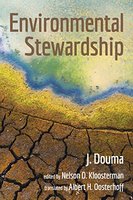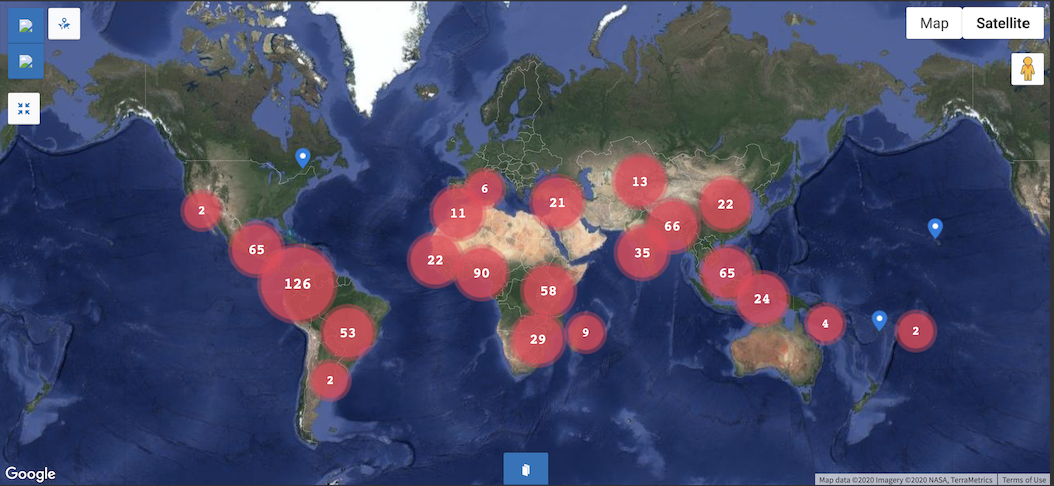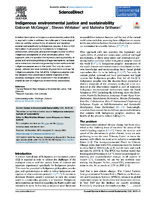Search
134 items
-
Episcopalians Confronting Climate Change
This article discusses American Episcopalians' concern over climate change and the impact with regard to those facing poverty. The introduction to the article is stated below:
"In September 2011, the House of Bishops in the Episcopal Church, attending a meeting in Quito, Ecuador, sent a pastoral letter to Episcopal clergy worldwide expressing 'mounting urgency' to address climate change within church membership. The letter argued the critical need for Christians to care for all of God’s creation and urged that justice be sought for the poor, who it said will suffer most from climate change." -
The Hope We Share: A Vision For Copenhagen
The Anglican Communion Environmental Network addressed the United Nations Framework Convention on Climate Change (UNFCCC)
Conference Of Parties (COP) Meetings, the Fifteenth Session, held in Copenhagen, Denmark in December 2009. They lament the consequences of environmental human footprints, some of which include the lack of drinkable water in various parts of the world, the increased difficulty to grow crops due to the water shortages, rampant consumerism, and subsidies for fossil fuels. -
Preachable Moments: Evangelical Christians and Climate Change
This article by Yale Climate Connections provides encouraging news of how some evangelical Christians are re-examining their stance on climate change. The following is an excerpt from the article:
"About 60 percent of evangelicals think climate change has nothing to do with human activities. By comparison, less than half of all Americans, or 47 percent, share that view. (Both figures are in sharp contrast to the overwhelming majority of climate scientists who agree that climate change is occurring and primarily caused by human actions).
Richard Cizik sees climate change as ‘top-tier issue’ for younger evangelicals. But the theological doors are beginning to open. Signs are that more evangelicals now are addressing climate change as a moral issue that appeals to the conscience of their Christian communities." -
Climate Change: An Evangelical Call to Action
This statement on climate change from members of the Evangelical Climate Initiative encourages church leaders and congregation members do what they can to take action to protect the Earth. A brief description of the group is provided below:
"The Evangelical Climate Initiative (ECI) is a group of over 300 senior evangelical leaders in the United States who are convinced it is time for our country to help solve the problem of global warming. We seek to do so in a way that creates jobs, cleans up our environment, and enhances national security by reducing our dependence on foreign oil, thereby creating a safe and a healthy future for our children. Our deep commitment to Jesus Christ and his commands to love our neighbors, care for “the least of these,” and be proper stewards of His creation compels us to act. Our views are articulated on the ECI statement page." -
ELCA issues statement on Pope Francis’s encyclical on climate change
In an effort to demonstrate solidarity of interfaith-based environmental action, the Evangelical Lutheran Church in America released a statement in support of Pope Francis's encyclical on climate change. The following concluding excerpt emphasizes the movement of solidarity within the statement:
"Today we join with Pope Francis in calling on world leaders to embrace our common responsibility as work continues toward a global agreement on climate change. We urge leaders to support an ambitious agreement that reduces greenhouse gas emissions, encourages development of low-carbon technologies, and supports the ability of countries to cope with the effects of a changing climate and build resiliency for a sustainable future." -
Lutherans Reflect on Climate Change Conference in Copenhagen
This article discusses some of the sentiments regarding proceedings from the 2009 United Nations Climate Change Conference in Copenhagen. While some attendees expressed disappointment in the outcome, others were more optimistic about steps which may lead to more effective action for climate change in the future. The following excerpt provides a brief description of the event:
"More than 3,000 ELCA members, along with a coalition of U.S. faith leaders, sent some 20,000 postcards to President Barack Obama, urging him to be at the meeting, she said. Obama attended the conference and urged leaders of Brazil, China, India and South Africa to join the United States 'to fund developing nations' projects to deal with droughts,
floods and other impacts of climate change, and to develop clean energy,' among other agreements, according to a U.N. news release." -
Why Lutherans Care for Creation
This article discusses how various concepts of Lutheran theology are woven into ecological messages with regard to God as creator, human interactions, and ways of worship. The following is a section from the introduction of the article, emphasizing human responsibility towards care for the Earth:
"For Christians, care of the Earth is not an 'environmental cause.' Rather, it is central to our holy calling to treasure the Earth and to care for it as our common home, fully integrating creation-care into our love of God and neighbor. Without sacrificing the transformational effects of the 16th-century Reformation, we are called to embrace an eco-reformation that will re-examine and rethink how we read the Bible, how we can expand the scope of our theology, how we can reconfigure our personal vocation and our common ethic, how we worship, how we organize our church life together, and how we understand ourselves as creatures within creation as a whole. This call to continuing reformation is for the whole church, not solely for the committed. Earth care is not an add-on. It is not just for those who happen to be interested in it. It is a call for all Christians to participate in this great work of our time." -
Caring for Creation Today
This video, put forth by the Evangelical Church in America, encourages individuals to act as stewards by both assisting those in need and caring for our land, as God had intended. The salient message is to do what you can to work for change and care for God's creation, as this is our duty as humans. -
Engaged Organizations: Islamic Society of North America
The Islamic Society of North America, headquartered in Plainfield, Indiana, has been described as the largest Muslim community in North America. Their vision includes empowerment of the Muslim community to strengthen interfaith relations, increase civic engagement, and promulgate a better understanding of the Islamic faith. They strive for organizational excellence, achieving this in part through their efficient operations, transparency, and financial stability. They seek to achieve their strategic goals by providing high quality programming and services for the Muslim community, increasing opportunities for civic engagement, and hosting an annual convention to gather in large numbers and discuss current issues that are affecting their community.
Part of the organization's mission is to focus on increasing sustainable practices within the Muslim community. Through the work of the Masjid Development Committee in December 2014, the ISNA Green Masjid Initiative Team was formed as “Green Masjid Task Group” and later renamed the "ISNA Green Initiative." The intent was to create awareness and to provide guidance on transforming mosques/Islamic centers to become more environmentally friendly through the use of sustainable practices. -
Environmental Stewardship
This book goes into detail about how the Christian religion goes about environmental stewardship. They look at how bible passages talk about preserving the Earth and the morals we should have surrounding it. It dives deep into how science interacts with human interaction with the Earth and the damage that we have done to Earth, as well as what we should do to correct ourselves. -
How Buddhist monks in Ladakh are fighting climate change
Buddhists Monks in the Himalayas are taking a stand to climate change. On Earth Day 2018, thousands of people came together in the village of Yerat to plant trees. The region is rapidly losing glaciers, causing a shortage in water supply to the villages in the area who rely on snowmelt for water. The volunteers were inspired to participate due to their devotion to His Holiness Kyabgön Chetsang Rinpoche and his vision for "a more verdant and organic Ladakh." -
GOP Rep. Mike Simpson: "It’s my party, and I’ll fight climate change if I want to"
An article published on Grist.org that covers Congressman Mike Simpson's views on salmon conservation. Simpson's statements are noteworthy for sustainability and religion as he is going against Republican party views by acknowledging an issue with climate change and the environment with his religious views. It is reported that his speech was obviously fueled by a spiritual obligation to preserve salmon as he describes salmon as incredible God created creatures and that their cycle of life should not be messed with. It is also important to note he was already elected for his 11th term in the house, so it is less likely that his more left leaning statements come from a desire to secure votes. -
Nature-Based Solutions Database
As a part of the Equator Initiative and the UNDP (United Nations Development Programme), the Nature-Based Solutions Database connects communities through sharing thousands of viable eco-solutions from 500+ communities across five continents.
Explore the Solutions Database to learn how outstanding local communities and indigenous peoples around the world are making possible the achievement of the UN Sustainable Development Goals through nature-based actions.
-
Conference of the Parties (COP)
The COP is the supreme decision-making body of the Convention. All States that are Parties to the Convention are represented at the COP, at which they review the implementation of the Convention and any other legal instruments that the COP adopts and take decisions necessary to promote the effective implementation of the Convention, including institutional and administrative arrangements. -
Green Umbrella Impact Team: Faith Communities Go Green
MISSION: Partnering with religious communities to create a more sustainable and equitable future for all by mobilizing their moral voice to reduce the risk of catastrophic climate change.
VISION: Religious communities collaborating to integrate care for creation in their lives and society. -
Ecological Consciousness in Jainism: Exploring Realities, Constraints, and Traditions
This paper explores the traditions and philosophies of Jainism and how that influences its connection to the environment. The author explains the Jainism cosmology and the distinction between different senses as they apply to animate and inanimate beings. Jain literature understands human connections to the world with an emphasis on the interconnectedness of life forms. To Jains, environmental concerns cannot be separated from socio-economic concerns. -
Indigenous environmental justice and sustainability
Current Opinion in Environmental Sustainability
Volume 43, April 2020, Pages 35-40 -
Sacred Watersheds and the Fate of the Village Body Politic in Tibetan and Han Communities Under China’s Ecological Civilization
Coggins studies the spiritual ecologies of Tibetan and Han communities in the People's Republic of China. The Tibetan animism focuses on the protection of landscapes because of their relation to various deities and spirits. Han communities worked on creating fengshui forests to find balance a balance of qi in all things. -
Interfaith Rainforest Initiative (IRI) Campaign Videos
The Interfaith Rainforest Initiative (IRI) creates artistic and well-produced videos that accompany their programs on climate change education and awareness-raising in branch offices around the world.
These videos are great resources for those looking for multimedia inspirations that amplify sustainability communications efforts. -
Should Rivers Have Right? A Growing Movement Says It’s About Time
“Should Rivers Have Rights?," published through the Yale School of Environment, addresses not only the growing impact of river degradation but also the spiritual connection that indigenous cultures have with river systems around the world. Attributing legal rights to rivers and other bodies of water will contribute to their protection from further human pollution as well as restoration of these natural areas. Through legal policy, rivers can be brought back to a safe state of equilibrium while also being preserved for indigenous groups. -
American Jewish World Service- Land, Water, and Climate Justice: Story Collection
The American Jewish World Service compiled a website of their outreach stories from the US, Africa, Asia, Latin America, and the Caribbean. Reflections from work with Indigenous communities are included as well. The environmental activism showcased on their website also defend women and their crucial involvement with agriculture and the environment. From the website;
"We aid communities and movements organizing to protect the land, water and natural resources that people depend on for their survival".
More information on how to get involved is listed on their website. -
Quench Their Thirst
"Welcome to the Quench Their Thirst Fundraising Project!
Water is a basic necessity of life, yet millions of people around the world lack access to this essential resource. By setting up a fundraising page, you can make a difference and help quench the thirst of those who need it most.
The money you raise will build water wells, boreholes and water filtration plants in rural communities in Africa and Asia, where people currently have no choice but to walk for miles to collect dirty, contaminated water. This not only puts their health at risk, but also takes up valuable time that could be spent on education, work, or caring for family members." -
Saving India’s Rivers: Ecology, Civil Society, Religion, and Legal Personhood
"Abstract: In recent decades, India’s environment has been severely compromised by riverine pollution combined with large-scale dams and exacerbated by diversion for irrigation. Most prominent among the rivers so affected has been the Ganges and its tributaries in northern India, which for Hindus include the country’s most sacred bodies of water. This paper examines three campaigns opposing dam construction, arguably the most widely publicized and analyzed efforts of this kind since independence in 1947. One campaign was essentially secular with virtually no religious component, the second mostly secular with some religious support, and the third almost totally a religious initiative. In the end, only the third attained any real success, and that rested on circumstances unlikely to be replicated. The possibility that future campaigns of this scale can be taken up again appears remote. Meanwhile, riverine pollution has continued to increase everywhere despite massive governmental programs to reduce it. Theoretically, it would seem that environmentalists and Hindu devotees with their veneration of nature should be able to work in common cause to reduce pollution, but any large-scale cooperation seems unlikely between these two disparate realms. More recently an effort to protect rivers by endowing them with legal personhood enjoyed an initial success, holding the promise that lawsuits could be brought on behalf of a river against those polluting it. The paper concludes that while the legal personhood strategy is currently stalled, it offers the best chance for eventual success in attenuating riverine pollution. In the course of the paper, a comparative theoretical framework for assessing anti-dam protests will be tested." -
Its promised land drying, Mormon Church works to save the Great Salt Lake
Due to overuse and climate change, the Great Salt Lake is drying and is estimated to disappear in about five years. In response to this, the Mormon Church of Jesus Christ of Latter Day Saints has started public conservation and water-saving efforts. This article describes these efforts and the role of the Great Salt Lake in the local environment and culture. -
The Intellectual Martian Society of “Stranger in a Strange Land” by Robert Heinlein
This chapter from the student-written book “Emerging Perspectives on Religion and Environmental Values in America” explores the environmental ethics and spirituality of the book Stranger in a Strange Land. Specifically, the author discusses the importance of water and the environmental impact of the book. Below is the first paragraph of the chapter to introduce the discussion.
"In 1961, the accomplished science fiction author Robert A. Heinlein shared his latest work with the world. In the fashion of a fairytale, Stranger in a Strange Land begins 'Once upon a time,' and goes on to describe the fantastic culture of Mars and its impact on human society. The timing of its publication in the early 1960s allowed for a short digestion period, so that it was ripe in the mind of the counterculture in the latter half of the decade. Themes of religious reform, free love, and a oneness with the cosmos permeate the book, and coincidentally rose to popularity during this time. The alignment of the novel with the counterculture cannot be understated: in 1967, the Freak Scene recorded a song entitled 'Grok!,' an homage to the word coined by Heinlein in Stranger in a Strange Land, and a year later the Byrds referenced water brotherhood in their song 'Triad.' The verb 'grok' even found its way into the vernacular of the counterculture (Blackmore, 1995). Messages about the sanctity of clean water and the positive potential of religion reached tens of millions, securing the legacy of Stranger in a Strange Land as one of the books which shaped religious and environmental values in the United States (Library of Congress, 2012)."

























